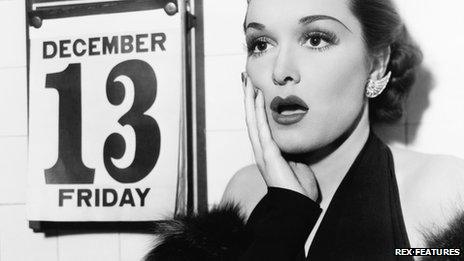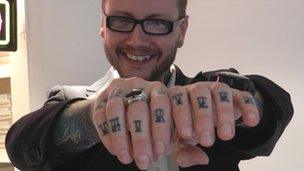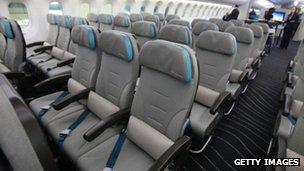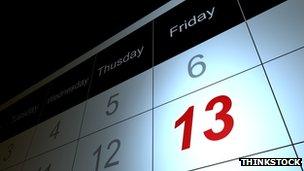Lucky and unlucky numbers: How some industries respond
- Published

Some people are not fans of Friday the 13th
"Friday the 13th is my favourite day," says Dan Gold enthusiastically from his tattoo studio in London's West Hampstead.
He has thirteen "13" tattoos inked on his skin, and on Friday he is adding another one.

But Dan Gold has no such worries
Having a superstitious symbol or 13 tattooed on Friday the 13th was originally celebrated as a symbol of rebellion.
Nowadays, the tradition continues, with tattooists charging £13 (or $13 in the US) on this day, making them highly popular.
But it is not just tattooists that feel the impact of superstition.
The housing market, the car industry, airlines and the film industry are all affected too.
Taking control
Victor Miller also has ink on his skin.
"I have a tattoo with the number 13 on my right wrist, indicating that the number 13 has been fabulously lucky for me and my wife and two sons," he says.
Mr Miller wrote Friday the 13th, one the most successful horror screenplays.
Indeed, the horror industry loves to play on the macabre connotations of this date.
Desmond Lam, associate professor of marketing at the University of Macau, says superstition offers people an illusion of control, which in turn offers them hope.
At times, it is simply a part of their culture, a learned value or behaviour passed down from generation to generation.
"People generally want to have control over events and their lives, which often they don't, he says.
"So, they use superstitious methods in an attempt to regain some form of control."
Unlucky seats?
Some industries are actively trying to control the number 13 and its impact. Take aviation.

Some airlines choose not to have a row 13
Some airlines are keen to avoid the 13 symbol, as design agency Hoet & Hoet discovered when asked to change their stylised "b" tail design, made up of 13 balls, to 14 for new Belgian carrier Brussels Airlines in 2007.
Others, though not all, omit seating row number 13.
"United's planes as well as AirTran and Comair don't have one," says air steward Bobby Laurie.
"A lot of folks have a fear of flying or a fear of not being in control when they're flying.
"For them, sitting in row 13 could just add insult to injury, so they removed the number 13 to offset any seating problems they may encounter from passengers who refuse to sit there."
Others, such as US Airways and American Airlines, have kept their 13th row, however, and air steward Laurie says he has "never encountered anyone refusing to sit there, so, maybe it's an outdated act by airlines to remove the row?"
Indeed, the idea that people are choosing not to fly on Friday the 13th appears to be a myth. On Friday, 13 April this year, for instance, there was no reduction in the number of passengers leaving London's Heathrow airport.
"I'd love to think that people are less willing to fly on Friday the 13th, because it would make tickets cheaper for us non-believers, but I've not noticed that fares fall on such dates," says Simon Calder, travel editor of the Independent newspaper.
Cheaper houses
The Society of the Irish Motor Industry is not that keen on 13 either, and wants "13" in new car number plates to be scrapped because it may put off potential customers.

Fewer homes are sold on this date, some in the property industry claim
The number 13 appears to be a bad omen for the building and housing market too.
Based on Land Registry data from 1999-2011, Findaproperty.com reported that 32% fewer homes sold on the 13th of the month than any other day.
They found that sellers living at number 13 could expect to receive £6,511, or 3%, less when selling their property than those who live at a different number.
Moreover, they found that 34% fewer properties sold with the number 13, than those numbered 1-12 and 14-30.
True believers?
It is not clear whether companies and consumers really believe the number 13 has negative power, or whether they are acting in spite of what they actually believe.
"I think there are the believers and there are the non-believers. Then, there are those who chose to believe even though they are sceptical or unsure," Prof Lam says.
"Many Chinese people I know fall in the third category. No-one wants to lose out.
"I believe people in this part of the world are highly susceptibility to superstitious beliefs. They may not believe in some of these superstitions, but prefer to act. They rather believe than not, especially when they have nothing to lose."
Luck and charm
If 13 is considered bad luck for both people and firms, other numbers are considered lucky.
The number 7 in the west and 8 in the Far East are seen as positive numbers.
Steve Varsano, chief executive of aeroplane broker The Jet Business in London is among the believers, having spent £8,888 on a mobile phone number that consists predominately of the number 8.
Mr Varsano believes that being culturally aware that the number 8 has positive connotations and represents good luck has created dialogue and good feeling, even before people dial his number.
The number seven also has an impressive influence, with record numbers marrying in Las Vegas on 7/7/7 - the seventh of July 2007.
"We find that many couples like to marry on 'numerical' days that will be easy to remember for anniversaries," says Robin Delaney, a clerk in Clark Country, Nevada, who registered 4,489 weddings on 7/7/7.
By comparison, only 933 weddings were registered on Valentine's Day, 14 February, this year.
But perhaps the most novel numerical business plan was hammered out by Californian clothing company Betabrand.
Last year, ahead of 11/11/11 - 11 November 2011 - the company created "cordaround" trousers - corduroys with horizontal stripes - to mark "the date which most closely resembles corduroy".